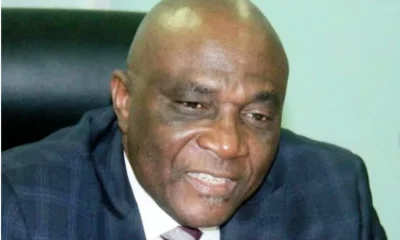Headline
FG To Dissolve Boards Of Federal Agencies, Parastatals

Acting under pressure from supporters pushing for political relevance, the federal government may have decided to dissolve the boards of federal agencies and parastatals, THISDAY has learnt.
However, because some of the positions are tenured, it is not certain how far it would be implemented, but there are strong indications that the Presidency may have given the Office of the Secretary to the Government of the Federation (SGF), the go-ahead to dissolve and reconstitute the managements and boards of the agencies and parastatals.
The green light to dissolve to board of parastatals has already alerted political lobbyists who are gearing up to be appointed in the event of the dissolution of the boards of the federal parastatals.
However, when contacted yesterday on the issue, the Director Information OSGF, Willie Bassey, said he was unaware of such presidential approval. There are about 42 agencies and parastatals directly under the supervision of the OSGF, that directly help the government in the daily running of varying and specific, oversight and administrative functions.
The dissolution of the boards is expected to help President Bola Tinubu to shape the agenda of his own administration. Some senior civil servants who spoke to THISDAY last night, said that it would not be out of place for Tinubu to dissolve the boards of federal parastatals inherited from former President Muhammadu Buhari.
They noted that his predecessor also carried out a similar cleansing exercise in 2015 when he aproved the dissolution of the governing boards of federal parastatals, agencies and institutions.
Under Buhari’s instruction, the chief executive officers of the affected parastatals, agencies and institutions were directed to refer all matters requiring the attention of their boards to the president, through the Permanent Secretaries of their supervising ministries.
Similarly, Buhari had also constituted the boards of the six aviation agencies less than 24 hours to the end of his administration after the agencies operated without boards for close to a decade, despite that their Acts make the constitution of boards mandatory.
The agencies were the Nigeria Civil Aviation Authority (NCAA), the Federal Airports Authority of Nigeria (FAAN), the Nigerian Airspace Management Agency (NAMA), the Nigerian College of Aviation Technology (NCAT), the Nigerian Meteorological Agency (NiMet) and the recently created Nigerian Safety Investigation Bureau (NSIB).However, the appointments were not confirmed as the ninth Senate could not ratify them before its dissolution and the subsequent inauguration of a new government on May 29.
Headline
Fagbemi warns against obstructing EFCC from performing its lawful duty

The Minister of Justice, Lateef Fagbemi, SAN has warned against obstructing the Economic and Financial Crimes Commission (EFCC) from carrying out its lawful duty .
Fagbemi’s warning is contained in a statement in Abuja.
“This is a matter of very grave concern, it is now beyond doubt that the EFCC is given power by the law to invite any person of interest to interact with them in the course of their investigations into any matter, regardless of status.
“Therefore, the least that we can all do when invited, is not to put any obstruction in the way of EFCC, but to honourably answer their invitation.
“A situation where public officials who are themselves subject of protection by law enforcement agents will set up a stratagem of obstruction to the civil and commendable efforts of the EFCC to perform its duty is to say the least, insufferably disquieting’’.
He added that running away from the law will not resolve issues at stake but only exacerbate them.
“Nigeria has a vibrant judicial system that is capable of protecting everyone who follows the rule of law in seeking protection.
“I therefore encourage anyone who has been invited by the EFCC or any other agency to immediately toe the path of decency and civility by honouring such invitation instead of embarking on a temporising self-help and escapism.
“This can only put our country in bad light before the rest of the world’’.
He said institutions of state should be allowed to function effectively and efficiently.
“I stand for the rule of law and will promptly call EFCC, and indeed any other agency to order when there is an indication of any transgressions of the fundamental rights of any Nigerian by any of the agencies’’.
NAN reports that the EFCC had on Wednesday warned members of the public that it was a criminal offence to obstruct officers of the Commission from carrying out their lawful duties.
Section 38(2)(a(b) of the EFCC Establishment Act makes it an offence to prevent officers of the Commission from carrying out their lawful duties. Culprits risk a jail term of not less than five years.
The warning , the EFCC said, became necessary against the background of the increasing tendency by persons and groups under investigation by the Commission to take the laws into their hands by recruiting thugs to obstruct lawful operations of the EFCC.
On several occasions, the anti graft agency said, operatives of the Commission have had to exercise utmost restraint in the face of such provocation to avoid a breakdown of law and order.
Headline
Unknown Gunmen Abduct Channelstv Reporter In Port-harcourt

Some unknown gunmen have kidnapped Joshua Rogers, the ChannelsTV reporter in Port-Harcourt, the Rivers State capital.
Politics Nigeria learnt that Rogers was picked up close to his residence at Rumuosi in Port Harcourt and to an unknown destination by the gunmen around 9pm on Thursday, April 11.
The reporter was driving his official ChannelsTV branded car when the hoodlums accosted, pointed a gun at him and took him away in the same vehicle.
Rogers was said to be returning from his official assignment in Government House after a trip to Andoni for a government event when the incident happened.
Already, the gunmen were said to have contacted his wife and demanded a N30million ransom for bis release.
His cameraman confirmed the incident and appealed to his abductors to set him free unconditionally.






















